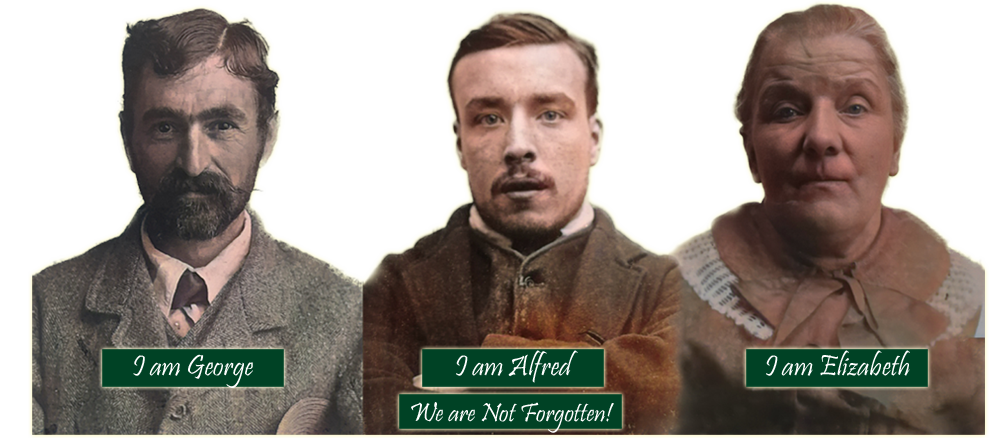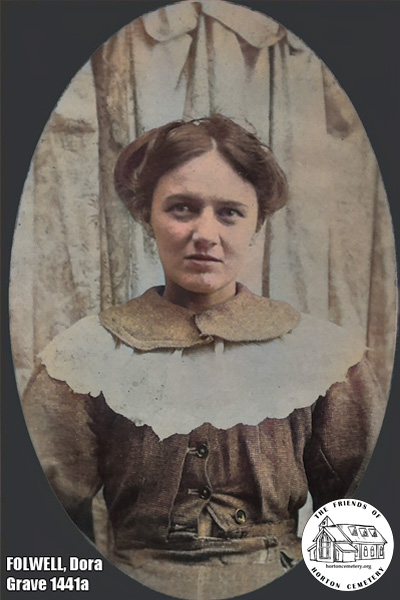b.1887-d. 1914
Dora’s family
Dora (actually Dora Inge) was born on 14th December 1887 in Battersea, Surrey. No baptism certificate has been found. Dora’s unusual second name came from her grandmother, Jane Inge Folwell.
Her parents were Herbert William Folwell (1856 –1930) and Rebecca Looker (1862 – 1930). Herbert and Rebecca married in Q1-1887 in the Chelsea registration district, London, though no church marriage entry has been found.
Herbert William’s parents, Herbert and Jane Inge, came from Canterbury in Kent where his father was a “Postmaster” before moving to Brixton in Surrey where Herbert William was born in 1856, one of five children.
The 1871 Census shows Herbert William as a pupil at the Leicester House
School in Carshalton, Surrey so we can assume he received a reasonable education.
The 1890s
In the 1891 Census Dora, aged 3, appears on the census living with her parents at
38, Thorparch Road, Lambeth. They also have two ‘boarders’. Her father, Herbert is 34 years old and is shown as a “Grocer’s Assistant”. Her mother Rebecca is 29 years and was born in Scotland. She is shown as a “Dressmaker”. Rebecca was one of eight children born to William Looker and Elizabeth Forrest.
In Booth’s poverty maps the houses in Thorparch Road are shown as “mixed, some comfortable, some poor”.
The 1900s
By the time of the 1901 Census a younger brother had arrived. Herbert William Jnr was born in Fulham, Surrey on 20th Feb 1892. A daughter, Una Aline had been born in 1896 but died at six months of “convulsions due to teething” and, according to Dora’s mother, she also had a still born child at some point. The 1901 census shows that the family is now living at 7, Firth Gardens, Fulham alongside another family of three. Herbert Snr is still working as a “Grocers Assistant”. Booth’s poverty maps shows this relatively new area as a “fairly comfortable/well to do”
A house in Firth Gardens today.
In 1900 Dora was admitted to the local Munster Road School aged 13. She had already spent 5 years at “All Saints School”. In 1899 the school leaving age had been raised to 12 years but we are told that she was “always first at school and took many prizes.” She had reached standard seven when she left aged fourteen and a half and she was said to be a “most promising pupil”.
Admission to the Colony and death
We know from the Lunacy Register that on 20th December 1910 Dora was admitted to the Ewell Epileptic Colony, Epsom. She was just 23 years old.
On the census of the following year, it says that her epilepsy started when she was 16 years old.
According to her admission notes Dora had been living at 40, Atlanta Street, Fulham and she is said to be a dressmaker although her mother says that she “helped at home mostly whilst her mother was working to keep the home going.” By this time Dora’s father Herbert was in the Fulham Workhouse and a letter sent to the Ewell Colony in Jan 1911 says that he is “neurotic but not insane.” He is suffering a nervous breakdown and general debility following the collapse of his business due to the “defraudations” (embezzlement) of his brother. His wife had reported that he “gives way to fits of temper, he talks to himself a great deal and had threatened suicide.”
The workhouse say that he presents no “mad” symptoms but gets depressed occasionally and does not try to get work but is content to remain in the Work House. Her parents are said to be “very temperate” but at her interview on 28 May 1911 it was noted that “the Mother smells of drink??”
Dora’s brother Herbert was also having difficulties at this time, being “too full of spirit” he has been “sent to the Church Army where he now earns his living”
It would seem that the extreme family circumstances at this time were taking their toll on everyone.
Her admission notes also state that Dora suffered a trauma when she was 15yrs old when she fell and broke her collar bone. It I was felt that this may have contributed to the onset of the Epilepsy. (If she hit her head at that time she may have suffered what is now called a ‘traumatic brain injury’ which can affect the onset of epilepsy.) For six years she had been treated at the “Epileptic Hospital in Queens Square, London” but in 1910 had been advised by the Fulham Guardians to “go to the Fulham Infirmary on probation for the Ewell Epileptic Colony” where, in Dec 1910 she is diagnosed with “Epileptic insanity.”
(The National Hospital for the relief and cure of Paralysis and Epilepsy opened in 1860, now known as The National Hospital for Neurology and Neurosurgery it was the first specialist Neurological Hospital in the world.)
The Epsom Cluster comprised five asylums built between 1899 and 1924. ‘The Colony’ opened in 1903 to cater for the “Epileptic insane of the Metropolis” and offered some new treatments recently made available.
Patients contributed to the whole of the cluster by working in some capacity in the laundry or the bakery or kitchen or outside in the garden or on the farm, and we can see from the census that Dora was working as a dressmaker.
Dora’s admission notes say that she was a “strict abstainer” whose fits had increased “through her fathers misfortunes and all that followed.” She is said to be “steady with regular habits but is childish in her manner and cannot work except under supervision.” Her general health was good, but she says she has “vivid dreams at times” Her manner is “quaint” and she says she comes from “old fashioned people.” Throughout her time in the Colony Dora continued to be described as “weak minded, childish, slow, emotional and confused, she suffered large numbers of major fits and minor attacks of “twitching” which doctors tried to control with medication, some of which made matters worse and had to be stopped.
Dora’s “vivid dreams” and hallucinations continued sometimes causing her to be disturbed and behave violently to others including the nursing staff, sometimes becaming uncooperative with the medical staff. It is noted that following these major events she is found to be “semi stenorose” (near unconscious) or “Cataleptic” (rigid of body or limb.*)
It seems that she did receive letters from her father and visits from her mother, as she is reported to have told her mother on one such visit, that she dreamt “she had left her there and was going around with another man.”
Dora’s low weight on entering the Colony is put down to “recent privations” but for some reason she is kept on a fish diet with not salt. Over time further weight loss is noted and in Aug 1912 she is “to have porridge.” In Jan 1913 she is “very thin” and 2pints of milk, 2 eggs and a pint of porridge daily is ordered.
As time goes on Dora’s mental and physical health deteriorates until by May 1914 she is dull, silent, and requiring help with all her personal needs. In a report to the S.R (Senior Registrar?) made in October of that year he says “she presents all the features of ‘Katatonia*, very markedly negativism, grimacing, mannerisms etc”.
Dora’s health continues to decline but she “resists examination or attention” and then on Dec 20th 1914 in the early hours she becomes noisy and restless until she has a seizure at 3.55. At 4.30 the Nurse notices a marked change and sends for the AMO and Matron. “Life was extinct when seen by the AMO at 4.38am. No evidence of Asphyxia. Death appeared to be caused by heart failure”. Dora was just 26 years old. Sadly Dora died at 4.35am on 20th December 1914 aged just 27 years. There were “no unusual circumstances”.
She was buried in the Horton Estate Cemetery on Christmas eve, 24th December 1914.
Dora’s family after her death
From that same census, 1911, we can see that Dora’s family seem to be in difficult circumstances. Her father Herbert William Snr is found as an “Inmate” in the Fulham Workhouse, Fulham Palace Road, Hammersmith, but we cannot tell if he is in the Workhouse or the Infirmary.
Rebecca is shown living alone at 63 Waldemar Ave Fulham where she has two rooms.
Their son Herbert William Jnr, aged 19, is an “Inmate” in the Church Army Hostel, 46 Acre Lane, Stockwell. He is said to be “formerly a general labourer”. I believe these hostels were night shelters where homeless men could get a hot meal and a place to rest but I could find little definite information about the Acre Lane Hostel.
You wonder why young Herbert could not go home to his mother if he was in such dire circumstances.
Whatever caused Herbert Snr to be in the Workhouse he seems to have recovered and continued living in the Fulham area until his death in 1stQ 1930.
The only other references to Rebecca come in 1918/9 & 1923 when she is shown on the Electoral roll living at 59 Waldemar Ave, Fulham, again living alone. I think that the family split up around 1910/11 but we have no clue as to why this happened.
Strangely, like her husband, Rebecca died in the 1stQ 1930. It would be interesting to see their death certificates to learn if they were living together again and when and from what they both died.
It is likely that they were both buried in North Sheen Cemetery which was opened when Fulham Palace Cemetery became full.
Dora’s brother, Herbert William Jnr appears to have served in WW1 in the Royal Army Service Corp, Pte RASC M2/098751 as shown on his army medal roll.
Possibly this is where he learnt to drive and work with motor vehicles as later, in the 1939 Register, he is living at 13, Putney Hill and he says he is a Chauffeur/mechanic and in 1949 he seems to be working for the Postal Service as a motor mechanic. His wife is shown only as F and I cannot find a marriage with this name; possibly she used a preferred name.
Herbert died in December 1956 in Battersea.
Author’s note
It is sad that there is so little to tell about this young lady. She seems to have come from a family where education was valued and they appeared to have lived comfortably. Dora’s illness at the age of just 16yrs must have put a strain on the family but they seemed to have managed and kept her with them until 1910.
We can only guess what caused the apparent split within the family – it may have been a domino effect of illness, loss of income and family breakdown. Let’s hope that we are able to see her records one day and answer some of these questions.



